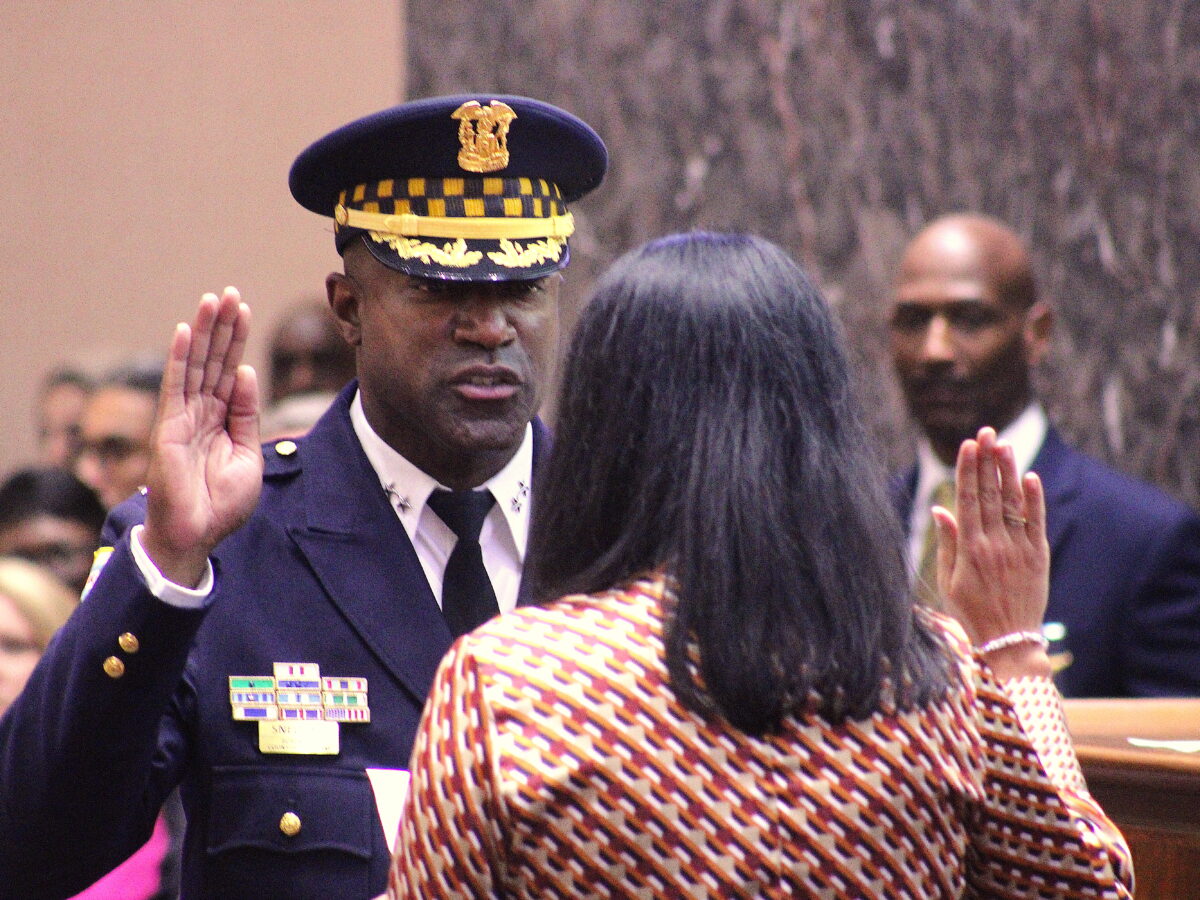Mayor Brandon Johnson’s 2024 budget includes funding to continue the city’s use of ShotSpotter, a controversial gunshot-detection system owned by SoundThinking, according to Ralph Clark, the company’s CEO. Clark also expressed optimism to investors this week that the Chicago Police Department’s (CPD) pilot of CrimeTracer, another SoundThinking product, will expand into the “mid or high six-figures” by the end of 2024. Johnson pledged to cancel the ShotSpotter contract during his campaign.
In a quarterly earnings call Tuesday, Clark noted that Johnson’s 2024 budget increased CPD’s funding despite calls by activists to reduce it. The budget “importantly also included funding for the continued use of acoustic gunshot detection technology,” Clark said. Johnson “has made the right decision, we believe, to increase the law enforcement budget, and there is a specific line item in that budget calling for acoustic gunshot detection.”
The mayor’s proposed 2024 budget includes a line item for “Software Maintenance and Licensing” totaling $8,967,998, the same amount budgeted for 2023. Clark was apparently referring to that item.
SoundThinking reported a record revenue of $24 million, representing a 28 percent year-over-year increase, on the call. The company has been expanding in recent years by acquiring products like CrimeTracer, a law enforcement database and search engine SoundThinking bought in 2022. Clark told investors he was optimistic that a pilot program CPD has with CrimeTracer will be expanded into “a mid- or high- six figure transaction in the latter half of 2024.”
In 2018, then-Mayor Rahm Emanuel signed a three-year $33 million contract with the company, which uses microphone arrays to detect loud noises and a computer algorithm to determine whether they’re gunshots. In August 2022, then-Mayor Lori Lightfoot quietly extended the contract through February 2024. In June, Johnson’s administration approved a $10.2 million payment for that extension; at the time a senior advisor said it was done by the Procurement Office without the mayor’s knowledge.
Activists have called on the city to cancel the contract for years. In 2021, the Office of the Inspector General (OIG) found that fewer than ten percent of Shotspotter’s gunshot alerts led to evidence of a gun-related crime and that police showed a pattern of stopping and frisking people more often in areas they considered more prone to ShotSpotter alerts.
“ShotSpotter alerts rarely produce evidence of a gun-related crime, rarely give rise to investigatory stops, and even less frequently lead to the recovery of gun crime-related evidence during an investigatory stop,” the OIG’s report concluded.
SoundThinking’s stock plunged after Johnson won the mayoral runoff, losing more than thirty percent of its value in the days after. Johnson pledged to cancel the ShotSpotter contract during his campaign, and staffers, including a South Side field director, have been active in the movement to end the city’s use of the gunshot-detection technology. Since his election, Johnson has declined to say whether he will extend the contract.
In a statement emailed to the Weekly on Thursday, a spokesperson for the mayor wrote that “the future of the contract will be assessed” in February 2024, when the current contract expires. “It is currently budgeted for the remainder of the contract,” the statement added.
Asked Thursday about Clark’s statements at the earnings call, Mayor Johnson reiterated that the ShotSpotter contract expires in February, saying “we’ll be able to have that conversation” then.
Clark noted on the earnings call that the budget still has to be formally adopted by the City Council and a new contract has yet to be inked. “And so we’re going to wait and see what actually gets hopefully ultimately signed off on and finalized [in] the final budget, and we’ll be feeling a lot better about things,” Clark said. “And we’ll still have some gates to go through because then you have to kind of take those budget dollars and get them to a realized contract, which will have until mid-February to do, which is when our current contract with Chicago ends.”
On the call, Clark added that he was “delighted” by Larry Snelling’s recent appointment as CPD superintendent. “He kind of grew up in Chicago PD, he’s been a very strong local defender of technology at large and specifically acoustic gunshot protection,” Clark said. “And so that’s really, really quite encouraging.”
Snelling has not been shy about his admiration for technology-driven policing. Last month he told Block Club’s Atavia Reed tech is “the number one way” to address crime, but when he’s been asked about ShotSpotter specifically, he has deferred to Mayor Johnson.
In a statement emailed to the Weekly on Thursday, Clark wrote, “SoundThinking has not been given any formal notification of Mayor Johnson’s plans relating to the use of acoustic gunshot detection after the current term ending February 2024. We remain hopeful that the city will continue to use and leverage this technology that leads to improved law enforcement response to under-reported community gunfire that has been proven to save lives.”
Another product SoundThinking has acquired is Geolitica (formerly PredPol), “predictive-policing” technology that has had its own share of controversy. Last month a joint investigation by Wired and The Markup found that less than 1 percent of the predictions made by PredPol for a police department in Plainfield, New Jersey were accurate. In 2021, The Verge reported that in 2013 a similar predictive policing approach CPD was then using resulted in a man being shot.
Freddy Martinez, the director of the digital transparency and research organization Lucy Parsons Labs (LPL) told the Weekly he’s troubled by the mixed messages coming from SoundThinking and the Johnson administration. Last week LPL released a statement criticizing Johnson’s proposed budget.
“Money talks, and I think it’s really troubling to hear noncommittal statements from the mayor’s office,” Martinez said. “If we’re hearing the companies telling their investors that they think the contract will be renewed, then I think there’s a lot of reasons to be troubled.”
Jim Daley is an investigative journalist and senior editor at the Weekly.




